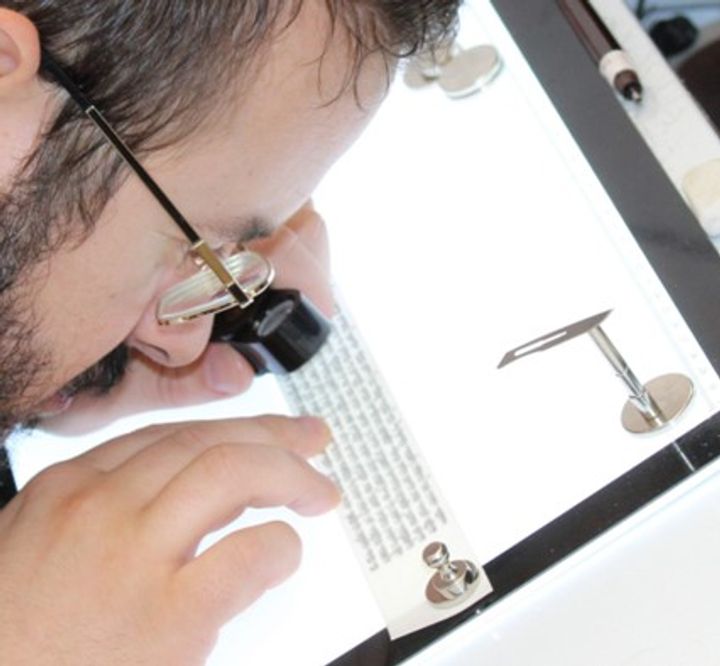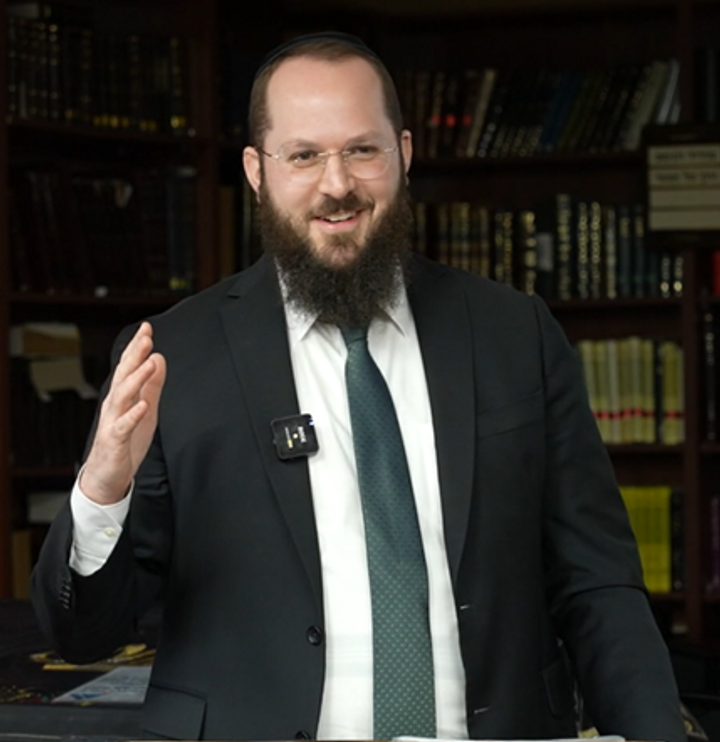In a Market Lacking Transparency, OU Kosher Partners with Israel-Based Non-profit to Improve Mezuzos Industry’s Kashrus

A STAMP-certified magiah checks parshios for Tefillin
New York, NY - Apr. 4, 2024 - It’s a situation which, Orthodox Union rabbanim say, unfortunately occurs far too often: a person invests in a number of beautiful new mezuzos at a Judaica store or from a sofer, sparing no expense to fulfill the mitzvah — never knowing that those mezuzos may actually be pasul (disqualified) or, at best, kosher b’dieved (barely kosher).
“People involved in checking mezuzos are finding too many mistakes at an alarming rate, to continue relying on an assumption of kashrus moving forward,” says Rabbi Sarna. “At the end of the day, even the stores selling the mezuzos don’t realize they may be selling something that is not up to par. To be clear, we’re talking about kashrus – not about chumras (halachic stringency) and hidurim (beautification or enhancements).”
Almost all of STa”M (Sifrei Torah, Tefillin and Mezuzos/Megillos) circulating in the world originates in Israel, which is home to the overwhelming majority of sofrim and magiim, trained experts in STa”M writing and inspection. The exponential population growth of the Orthodox community and increased engagement in religious life have generated a marked increase in demand for STa”M. This has led to a flooding of the supply market, with individuals producing and selling varying qualities of mezuzos with limited assurance of kashrus for the consumer.
“There is currently insufficient oversight of the mezuzah industry,” says Rabbi Sarna. “Since the general public is largely unfamiliar with the complex halachos of STa”M , there is a significant risk that the mezuzos sold on today’s market may not meet basic halachic standards.
As many intricacies go into writing a kosher STa”M article, Rabbi Sarna says the potential for mistakes is tremendous.
“Each mezuzah contains over 700 letters, and multiple components. In many cases, if even one is off, the entire mezuzah can be pasul. Moreover, even if everything appears to be correct, it could still be pasul because of the manner in which it was written. For example, as the mezuzah must be written in the original word order, if a sofer writes the word ‘Shema’ and then decides to scratch out the ‘mem’ and redo it, the entire mezuzah would be unusable.”
Rabbi Avraham Lessin is the founder and director of STAMP (STa”M Project), a Jerusalem-based nonprofit funded in part by the Mayberg Foundation in Chevy Chase, Maryland. Launched in 2018 together with Louis and Manette Mayberg, an OU board member, STAMP aims to restore transparency and accountability to the world of STa”M through a rigorous quality assurance process.
“I am truly grateful to the Maybergs who saw the positive change it could bring about for Klal Yisrael and were willing to take a chance on a new venture,” says Rabbi Lessin.
Rabbi Lessin became aware of the issues affecting mezuzos about 14 years ago, while working as a sofer and magia. As people increasingly submitted mezuzos for him to check, he repeatedly found a number of problems with the writing itself — such as spelling errors and improperly formed letters — as opposed to issues caused by natural wear and tear or heat and moisture.
“I realized that the industry had no system of checks and balances,” says Rabbi Lessin. “Because of that, there were problematic articles flooding the market which had never been properly reviewed or fixed. Together with the industry's leading rabbanim, we created an infrastructure where STa"M articles pass a quality control stage before going out to the public.”
Recognizing the seriousness of this dilemma on a communal scale, the OU is partnering with STAMP to oversee the kashrus of mezuzos as a communal service to the North American Jewish community.
OU Kosher, the world’s largest and most widely recognized international kosher certification agency, is not only lending its extensive experience in the supervision of various processes and projects, but also its name and reputation to all mezuzos confirmed kosher lechatchila (completely kosher) by STAMP, through the OU STa”M Pikuach Initiative. Accordingly, consumers can now ask for OU mezuzos by name.

STAMP founder and director Rabbi Avraham Yechezkel Lessin
Rabbi Lessin is honored to partner with the OU.
“In essence, STAMP is doing for STa”M what the OU did for kosher food,” he says. “We share that common passion to bring about a kind of revolution. To collaborate with them on an organizational level is an incredible privilege. On a personal level, having their guidance and experience gives our organization a huge leg up. It's truly a zechus to be able to work with such fantastic people who are involved l’shem shamayim.”
Rabbi Sarna says that in providing pikuach for mezuzos, the OU does not expect to eliminate every mistake, only to make them rare.
“The production of every mezuzah is halachically complex, labor intensive, and contains thousands of minute details that affect its kashrus,” he notes. “We will make continuous efforts to refine and improve our process based on the feedback we receive. The consumers who provide that feedback will be our partners in this.”
Under the guidance and supervision of STAMP’s Rabbinic board comprising leading industry experts Rabbi Chaim Sperling, Rabbi Moshe Uri Bloi, Rabbi Yaakov Zions and Rabbi Reuvain Mendlowitz, all STAMP sofrim must pass tests confirming their halachic knowledge. They must also submit character references and writing samples to compare against the mezuzos they hand in, in order to ensure that they actually wrote them.
“Many magiim in Eretz Yisrael are remunerated per mezuzah and are incentivized to work as fast as they can,” says Rabbi Lessin. “STAMP also pays magiim per mezuzah, however our thorough inspection system eliminates the concern that mezuzos may not have been carefully scrutinized. That system comprises a chain of two separate magiim who check a completed mezuza, which is then inspected by rabbonim, examined once again by both magiim, and scanned by an AI-powered program.”















